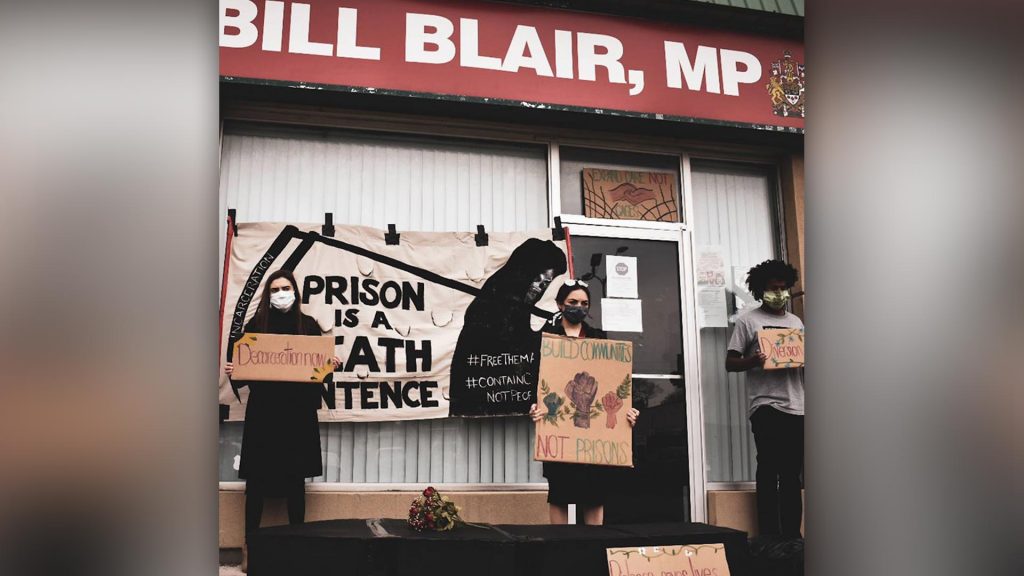
(Members of the Toronto Prisoner’s Rights Group in front of Public Safety Minister Bill Blair's Scarborough constituency office. Photo: Toronto Prisoner’s Rights Group)
A group that advocates for people incarcerated in Canada’s penitentiaries held “Where is Bill Blair” marches in Ottawa and Scarborough (Toronto) in the hopes of forcing the minister to take action to protect the inmates during the COVID-19 pandemic.
Blair, as minister of Public Safety, is responsible for the Correctional Service of Canada (CSC) and the Parole Board.
“We looked for Minister Blair in Ottawa and Scarborough to answer questions about how he is handling the COVID-19 pandemic behind bars and to demand he take meaningful action to prevent COVID-19 transmission in federal penitentiaries,” said a statement from The Abolition Coalition which, according to the group, is made up of dozens of prison abolition groups across the country including the Toronto Prisoner’s Rights Group and the Criminalization and Punishment Education Project.
“We did not find him. Did you?”
Indigenous prisoners, which make up more than 30 per cent of Canada’s prison population, are particularly at risk, say advocates who are pushing for more protective measures including release.
According to the group, “343 federal prisoners and more than 123 Correctional Service Canada employees contracting the coronavirus,” said the statement. “Two federal prisoners have died from COVID-19 that we know of. He needs to be held to account and have to answer for his lack of compassion.”
While Blair (Scarborough Southwest) has been taking part in the virtual Question Period sessions, he has not made himself available to media to answer questions on inmate safety and COVID-19.
APTN News and other news outlets have been trying to get information from his office, and CSC, on the number of inmates who have been released from penitentiaries because of the virus.
This follows a government briefing on COVID-19 on May 5 where Blair said that “hundreds” had been released from several federal institutions because of COVID-19.
The former Toronto police chief turned politician also assured Canadians that the government, CSC and the Parole Board took “a number of very significant steps” to ensure the health and safety of the inmate populations.
“[Corrections officials] have been working hard to make sure those individuals are considered for early release, and literally hundreds of people have, in fact, been placed back into the community,” he explained.
Blair said at the time that more than 600 federal inmates applied for early or exceptional release because of COVID-19.
But according to statistics from CSC, about 600 inmates are released from federal institutions monthly during normal operations.
It’s not clear whether Blair misunderstood the question at the news conference, or as Abby Deshman, director of the Canadian Civil Liberties Association (CCLA) suggests, is misleading Canadians.
“In any given month CSC releases a few hundred people, that’s not an increase over what would be considered normal business for CSC,” Deshman told APTN. “And I don’t think normal business is a sufficient response to this unprecedented health crisis.
On Tuesday, several civil liberties groups including the CCLA filed a charter challenge against CSC on the issue of how the government is handling inmates and COVID-19.
“What we would be looking for is really an indication that CSC has taken more steps then it would in normal courses its work to triage the population and make sure the people are safely housed,” said Deshman.
APTN has requested several interviews with Blair. None have been granted.
APTN also asked when the minister will be appearing again at the government’s daily COVID-19 briefing – that information was not available.
In response to questions about the prisoner release, Blair’s office sent a statement that did not address the question.
The Abolition Coalition said more marches are planned “unless Minister Blair actually starts getting down to the business of releasing federal prisoners’ to the degree that is safely possible with appropriate community supports,” said the statement.
“Two months into this pandemic, you would think that reasonable measures would be in place by now. But then again, this is federal ‘correctional’ system we are talking about.”
With files from Lindsay Richardson and Jamie Pashagumskum.










